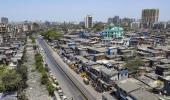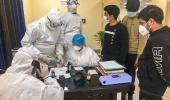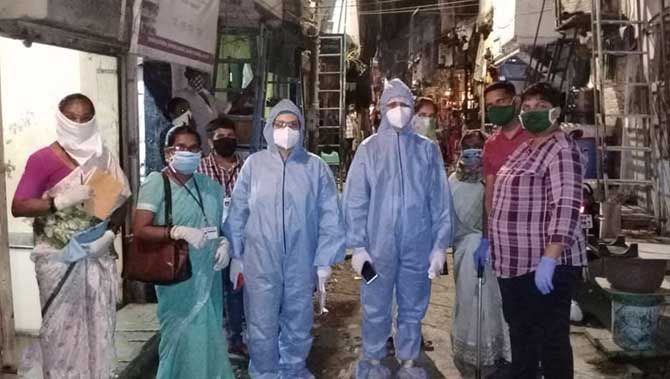
How do those in the frontline risk their families just so that we win this battle against the coronavirus?
Hear it from someone who confronts the danger every day:
"We are in constant fear of getting infected 24x7; even after coming home, we are not knowing if the virus has actually entered our bodies or not. That is a constant fear."
"I'm not concerned about my younger sister because I know if she is infected, she will get cured very soon. But I have a father who is 56; he has co-morbid conditions; he's hypertensive and epileptic. My mother is 55."
"We know how difficult it is to come into contact with a COVID-19 positive patient even after wearing the PPE suit."
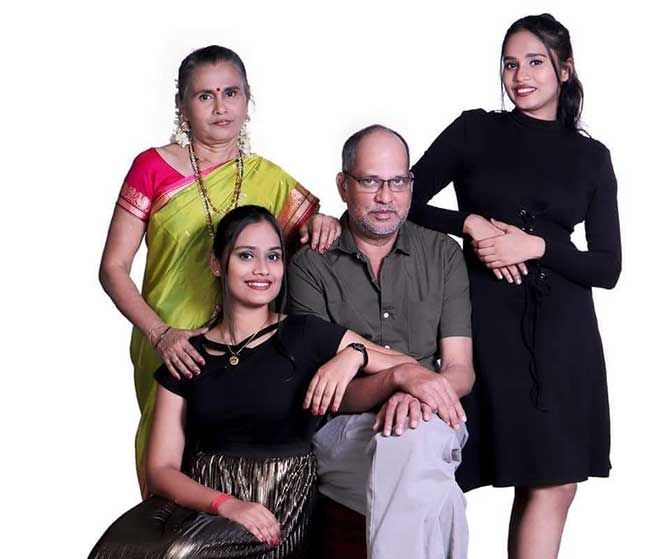
"Even wearing the PPE kit for four to five hours is not an easy task. Because it's so suffocating; you cannot even drink water during that time because you have to use your hands to remove the mask, your PPE suit and only then can you have food or water that too after sanitising yourself completely."
"We can't drink water or eat anything for four to five hours after wearing the PPE kit."
Prasanna D Zore/Rediff.com speaks to Manjula Chimbalkar (seated in the family photograph), a health coordinator who along with Dr Tejaswi Kakde has been visiting one COVID-19 positive home in Dharavi, north central Mumbai, to another ever since the first case came to light in the city's largest slum on April 1.
The second in the series on those brave, incredible, heroes who lead the war against the coronavirus:
My job, my team...
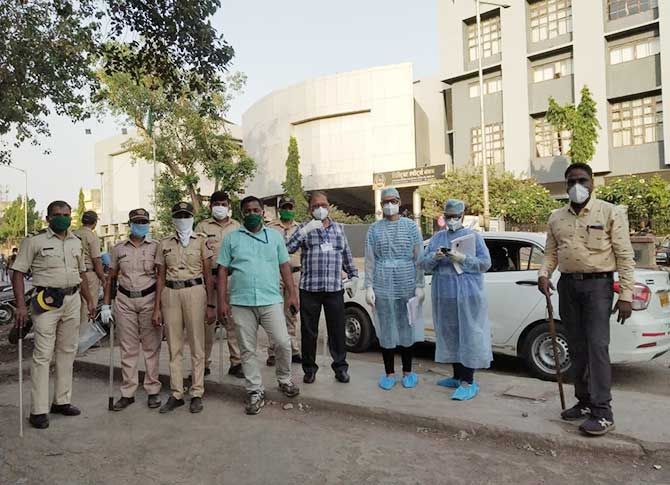
I am posted as a health coordinator for the G North ward, which covers Dadar, Dadar West and also Dharavi. I have done my diploma and degree in health and hygiene from the All India Institute of Local Self Government.
We -- Dr Tejaswi Kakde and I, along with a few policemen and BMC (BrihanMumbai Municipal Corporation) officers -- are a mobile team of investigators.
What we do is when cases get reported from all the peripheral hospitals -- at a point, we get 10 to 12 cases at a time which treat COVID-19 patients -- we take their addresses, wear our PPE kits, N95 masks and rush out to the place where these patients reside.
If they are residing at their own home we shift them to hospitals for further treatment. If they are already in hospitals, we go there, we talk to these patients, their families, we try to get their travel history, or any history of going out, even to other states (within India).
We also try to identify the high-risk (from the family) and low-risk contacts (their neighbours) of that positive patient.
We have a protocol if they have a common toilet, like say in Dharavi, then the family of the positive patient is shifted to a quarantined place.
We shift such high-risk families to the Rajiv Gandhi Sports Complex at Rajiv Gandhi Nagar in Dharavi. They get all the facilities like food packets, proper sanitation and hygiene; everything is taken care of (by the BMC).
Low-risk contacts, like their neighbours, who may have come into contact with the positive person, are identified.
We cover 25 houses each in all four directions -- because in slums people don't take a linear route; the routes are often winding and serpentine -- starting from the house of the person who has tested COVID-19 positive.
We try to find out whether the patient has come into contact with friends from neighbouring areas or had approached any private medical practitioner (PMP) in the initial few days when s/he had basic cold and cough problems.
If that is the case, then we quarantine all the people who have come into contact with the positive patient including the PMP. We seal their clinic for 14 days.
We make sure to take the swab of high-risk people (the immediate family of the positive patient), who we had shifted to the Rajiv Gandhi Sports Complex, and send them for investigation the very next day.
If any of these high-risk people test positive for COVID-19, then we move them from the Rajiv Gandhi Sports Complex to hospitals where COVID-19 positive patients are treated.
Depending upon the co-morbid conditions of the patients, G North ward shifts (COVID-19 positive) patients to the Seven Hills Hospital in Marol (north west Mumbai), Raheja and Hinduja Hospital in Mahim (north central Mumbai), and KEM Hospital in Parel (central Mumbai) and the Kasturba Hospital (central Mumbai).
If the person has co-morbid conditions like hypertension, diabetes or asthma, then we shift them to Kasturba or KEM.
We have a few ambulances waiting outside the serpentine lanes in Dharavi to shift high-risk people to the Rajiv Gandhi Sports Complex in case a need arises.
Sometimes the tenements are so low that we cannot stand so we have to sit down. Because of my height (Manjula is 5'5") I have to sit down on the floor; you cannot expect any benches or chairs waiting for you there.
We sit down and talk to the family to note the entire history of the COVID-19 positive patient, the people who s/he had come into contact with, her/his travel history, etc.
Sometimes when we are talking to the patients, they don't interact or they don't cooperate. We have a police team as our backup. They are the most supportive people, I would say the Dharavi police team is the most supportive team I've ever met.
The moment we give them a call that we have to rush to this place, they they just locate the place and where the patient resides. They get everything done; they have a team there.
How the day begins and ends
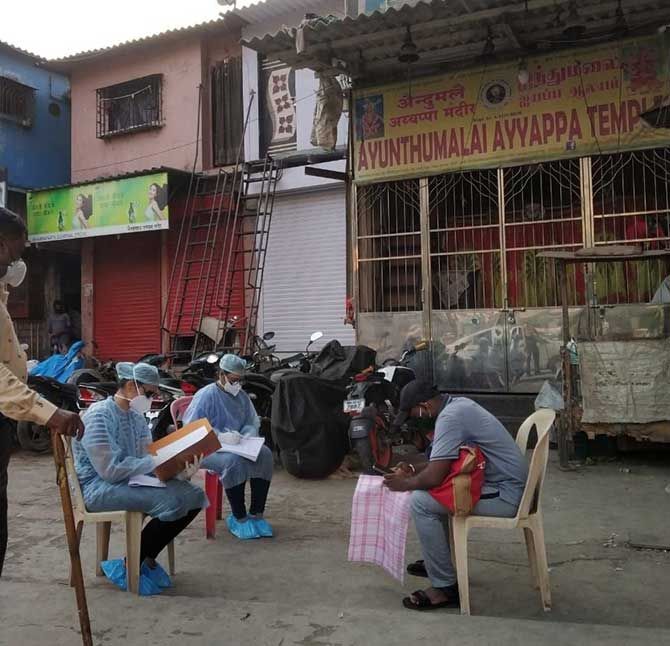
I get up at 8.30 or 9 these days because I sleep late. After completing my daily chores I make sure that I have my lunch and go to office. Around 1.30 pm I reach G North's ward office in Dharavi.
As soon as we reach office we check our mails. Depending upon the cases assigned to us for the day we go to patients's homes.
We get mails from COVID-19 testing labs which are at the Haffkine Institute in Parel, from the Kasturba and Hinduja hospitals, from private labs.
We get a call from these testing labs informing us about the places in G North ward where they have found COVID-19 positive patients.
Every ward gets this list and every ward takes similar action once they get this list. We visit them and perform all the tasks that I had mentioned before.
Once we are done with our backlog, we also follow up with the condition of the high-risk people shifted to the Rajiv Gandhi Sports Complex, whether their swabs have been taken, tested and if their reports have arrived.
Depending on whether the reports are positive or negative, we either shift them to hospitals for further treatment and if negative we keep them in quarantine for the next 14 days at the Rajiv Gandhi Sports Complex.
Every day we get at least 10 to 12 fresh COVID-19 positive cases.
Once we get their addresses, the next moment we are into our PPE kits heading towards the addresses and homes of these patients to perform the routine mentioned earlier.
By the time we come back and file our reports, it is well past midnight. We reach home by 1 am to 2 am.
Precautionary/protective measures
Every single day we come into contact with COVID-19 positive patients or high-risk people.
As of now, we have our N95 masks which work like our shields right now.
Then we wear our PPE kits and while meeting COVID-19 positive patients or high-risk people we try to maintain a distance of one metre. Of course, this is not possible in a place like Dharavi.
We investigated two deaths two days ago and the homes where these COVID-19 deceased lived were not even 100 square feet in Dharavi's Mukund Nagar.
Seven people lived in one of these houses which was like a one-plus-two storey structure (ground plus two). (Editor's note: This gives a sense of how congested and clustered Dharavi and many other slums in Mumbai are.)
Precautions while at home
When I reach home by 1 or 2 in the morning, they are all sleeping.
I make sure that I quarantine myself even though it's not possible 100 per cent of the time I am home.
I make sure I maintain a distance; I have my dinner, whatever it is, from a safe distance. I also ensure I am wearing a (fresh) mask and (a fresh pair of) gloves when I am home.
Not just for health coordinators like me and doctors who come in contact with COVID-19 positive patients, but this protocol needs to be followed by everybody who ventures out, say to buy vegetables, groceries or whatever essential requirements. It will be useful for all.
When I reach home I take a hot water bath. For ladies, it is not always possible to wash their hair. Especially ladies with long hair. You can get a cough and cold if you wash your hair every day.
Then I have a glass of hot water with a little salt in it. I gargle at least 10 to 20 times. Then I drink a glass of hot water with a little turmeric and cardamom powder. Haldi (turmeric powder) is always a saviour.
Sometimes late at night I feel my throat is sore.
Whenever I reach home I make sure that I completely sanitise myself. All my clothes are washed by me in hot water.
We can only take these precautions and pray.
All of us use hand sanitisers and follow all the recommended protocols to perfection.
What goes through my mind?
Of course, we are in constant fear of getting infected 24x7. Even after coming home, we are not knowing for better or worse if the virus has entered our bodies or not. That is a constant fear.
My family consists of my father, mother and younger sister. I am not concerned about my younger sister because I know if she is infected, she will get cured very soon.
But I have a father who is 56; he has co-morbid conditions; he's hypertensive and epileptic.
So that (of passing the infection to my father and mother) is a constant fear; also my mother is 55.
So, it's a constant fear like, what if they get infected because of me, obviously, because they don't step outside.
Family's worries
Every day when I leave home they have tears in their eyes, especially my parents. They are like, 'Why don't you stay home? (Even if you don't report for duty) the world is still going to go on. Nothing is gonna happen if you stay home.'
What do I tell them?
I tell them it is my duty. I am part of the public health department which works during medical emergencies.
Even though I'm not actually going out and treating patients, every day I contact at least 10 to 12 (COVID-19) positive patients from Dharavi.
Yesterday (on the night of April 11) I came back home by 11.30 pm after investigating about seven to eight cases which were also high-risk contact cases of people who were (COVID-19) positive.
The index case (the main person in the family who tests COVID-19 positive) was someone and they were the family of that index case.
An index case for us is a person who randomly tests positive from any area. But when the very immediate family of that index case shows symptoms, then it is considered high-risk patient of that index case.
My family don't say this, but I am always scared what if I get infected and pass it on to my parents.
Life under the PPE suits
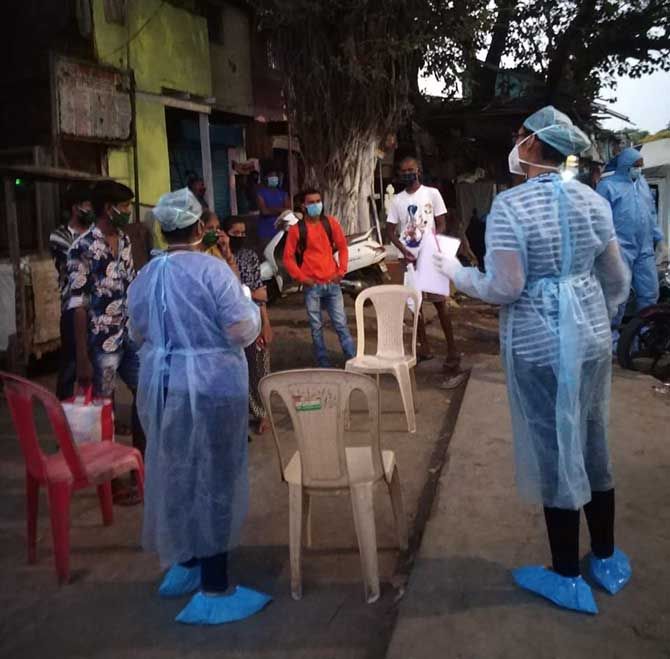
People generally have a notion that once you wear the PPE suit, there's no chance of infection.
I've heard people saying 'Oh, they are wearing the PPE kit. So they are safe.' But we know how difficult it is to come into contact with a COVID-19 positive patient even after wearing the PPE suit.
Even wearing the PPE kit for four to five hours is not an easy task. Because it's so suffocating; you cannot even drink water during that time because you have to use your hands to remove the mask, your PPE suit and only then can you have food or water that too after sanitising yourself completely.
We can't drink water or eat anything for four to five hours after wearing the PPE kit.
Just imagine a person or a team with PPE kits and you are going to slums and then to know that you are into the positive patient's house.
You have been there, you sat there, met so many people; once these thoughts go through your mind, we cannot even have courage to hold a bottle of water, forget about opening it and actually drinking water from it.
That's the kind of fear we all have, but still we go out there and work.
Before wearing the PPE, we make sure that we drink right amount of water. You cannot drink a lot of water and venture out because you can't rush to the washroom once you are in it (PPE). That is, of course, not possible when you are out there in the field.
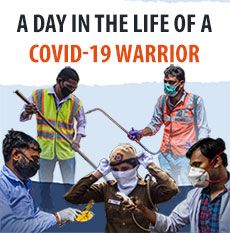
Disposing PPEs off
A PPE is worn only for the day. After we report back to office, the PPE is very safely disposed off at Dadar's Shivaji Park crematorium every day.
We get new PPEs and new masks the next day. That is reassuring and we are thankful we have a new set everyday.
When we investigated the first (death) case in Dharavi on April 1 we were not even wearing the PPE kit because we were not expecting a death case.
If you check the statistics, G North ward got the cases very late. I still remember the first COVID-19 positive death case that happened on April 1 (in Dharavi).
The moment the mail came that there was a death case of COVID-19 we had to rush. We just had a mask, which was, I guess, not even N95. We wore two surgical masks and gloves and went to investigate this case.
Photographs: Kind courtesy Manjula Chimbalkar


